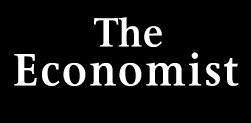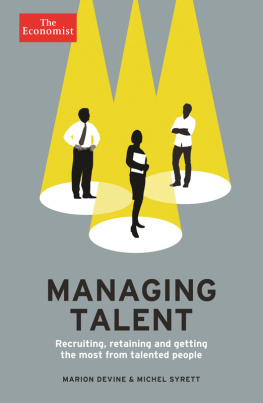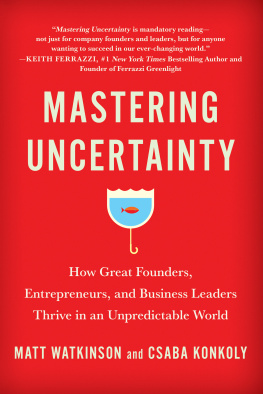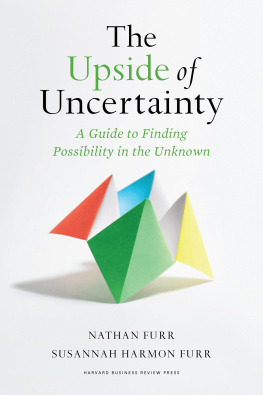MANAGING UNCERTAINTY
OTHER ECONOMIST BOOKS
Guide to Analysing Companies
Guide to Business Modelling
Guide to Business Planning
Guide to Cash Management
Guide to Economic Indicators
Guide to the European Union
Guide to Decision Making
Guide to Financial Management
Guide to Financial Markets
Guide to Hedge Funds
Guide to Investment Strategy
Guide to Management Ideas and Gurus
Guide to Managing Growth
Guide to Organisation Design
Guide to Project Management
Guide to Supply Chain Management
Numbers Guide
Style Guide
Book of Business Quotations
Book of Isms
Book of Obituaries
Brands and Branding
Business Consulting
Business Strategy
Buying Professional Services
The City
Coaching and Mentoring
Doing Business in China
Economics
Emerging Markets
Marketing
Megachange
Modern Warfare, Intelligence and Deterrence
Organisation Culture
Successful Strategy Execution
The World of Business
Directors: an AZ Guide
Economics: an AZ Guide
Investment: an AZ Guide
Negotiation: an AZ Guide
Pocket World in Figures
The Economist
MANAGING UNCERTAINTY
Strategies for surviving and thriving in turbulent times
Michel Syrett and
Marion Devine

Managing Uncertainty
Strategies for surviving and thriving in turbulent times
Michel Syrett and Marion Devine

PublicAffairs
THE ECONOMIST IN ASSOCIATION WITH
PROFILE BOOKS LTD and PublicAffairs
Copyright The Economist Newspaper Ltd, 2009
First published in 2009 by Profile Books Ltd. in Great Britain.
Published in 2014 in the United States by PublicAffairs, a Member of the Perseus Books Group
All rights reserved.
publicaffairsbooks.com
No part of this book may be reproduced, stored in or introduced into a retrieval system, or transmitted, in any form or by any means (electronic, mechanical, photocopying, recording or otherwise), without the prior written permission of both the copyright owner and the publisher of this book, except in the case of brief quotations embodied in critical articles and reviews. For information, address PublicAffairs, 250 West 57th Street, 15th Floor, New York, NY 10107.
The greatest care has been taken in compiling this book. However, no responsibility can be accepted by the publishers or compilers for the accuracy of the information presented.Where opinion is expressed it is that of the author and does not necessarily coincide with the editorial views of The Economist Newspaper.
While every effort has been made to contact copyright-holders of material produced or cited in this book, in the case of those it has not been possible to contact successfully, the author and publishers will be glad to make amendments in further editions.
PublicAffairs books are available at special discounts for bulk purchases in the U.S. by corporations, institutions, and other organizations. For more information, please contact the Special Markets Department at the Perseus Books Group, 2300 Chestnut Street, Suite 200, Philadelphia, PA 19103, call (800) 810-4145, ext. 5000, or e-mail special.markets@perseusbooks.com.
Library of Congress Control Number: 2014932070
ISBN 978-1-61039-513-7 (EB)
First Edition
To our partners Suzy and Stephen
Contents
Case examples: Capital One Bank, GlaxoSmithKline, Procter & Gamble, RBS, Singapore government, Tata Group
Case examples: Balfour Beatty, Capital One Bank, Cochrane Collaboration, Ford Motor Company, Honda Europe, HSBC Rail (UK), Marsh, Nokia, Random House, RBS, Simmons & Simmons, States of Jersey, SunGard India, Wipro Infocrossing
Case examples: Balfour Beatty, Cisco Systems, GlaxoSmithKline, Netflix Random House, RBS, Simmons & Simmons
Case examples: Ceridian, Ford Motor Company, GlaxoSmithKline, Honda Europe, Lloyds TSB, Random House, Royal Dutch Shell, Simmons & Simmons, States of Jersey
Case examples: Best Buy, Burberry, Diageo, GlaxoSmithKline, Ford, W.L. Gore, HCL Technologies, Marsh, Random House, Wipro Infocrossing
Case examples: Ceridian, Cisco Systems, Deutsche Bank, IBM, Walmart
Acknowledgements
IN PRODUCING THIS BOOK, we have been helped by a number of individuals and organisations that require acknowledgement.
First and foremost, we would like to acknowledge PA Consulting Group (PA), which undertook in collaboration with the authors a survey of 205 international businesses in spring 2011. The results of this survey provided us with statistical evidence on which to base our conclusions and contact with the majority of the senior executives whom we interviewed for the book.
In particular, we are grateful for the support and encouragement of Mark Thomas, a business strategy expert at PA, instigator of the survey and a published author in his own right on the topic of strategic determination in an age of uncertainty; Jackie Howell, senior global marketing manager; and Melanie Albury, a PA consultant, who oversaw the survey design and analysis.
We would like to acknowledge the support and encouragement of other thought leaders on this topic, most notably Donald Sull, a professor at London Business School, and Eric Beinhocker, a senior fellow at the McKinsey Global Institute, who contributed their thoughts and insights to this book.
We would also like to thank the many senior executives who allowed us to interview them for the book. Their names appear throughout the text but the organisations they represent span Ashridge, Balfour Beatty, Capital One Bank, Ceridian, Ford, GlaxoSmithKline, Honda Europe, London Business School, IMI, Marsh, McKinsey, Random House, Royal State of Jersey, Simmons & Simmons, SunGard India, Wipro Infoprocessing and the UK governments Foresight project.
On the editorial side, thanks to Stephen Brough and Penny Williams; and thanks to Sally Harper for her private editing support. Lastly, we would like to thank our partners, Suzy and Stephen, for putting up with long weekends of us being chained to the computer and immersed in mutual deliberation.
Foreword
IN THE AFTERMATH of the global financial crisis, we face a business challenge that is unprecedented in our lifetimes. With the continuing euro-zone crisis, the return of several major economies to recession and the real possibility of a hard landing in China, it is clear that uncertainty remains with us.
When PA Consulting Group launched its managing uncertainty survey, it was with the conviction that the unfamiliar business environment would continue for years to come. Our aim was to analyse executives responses to the crisis to understand what worked and what didnt. The results were striking: we found that the conventional response to a recession, battening-down the hatches as it was often put to us, had actually been the losing strategy. We had expected to see a trade-off between speed and quality of decision- making; what we saw was that those who understood the nature of the crisis responded both faster and better. Most importantly, we found that the winning mindset was neither optimistic (optimists tended to underplay the significance of the crisis) nor pessimistic (pessimists tended to be too defensive in their responses) but one of proactive realism: facing the possibility of drastic change, and seeking the opportunities within the chaos.
Next page








